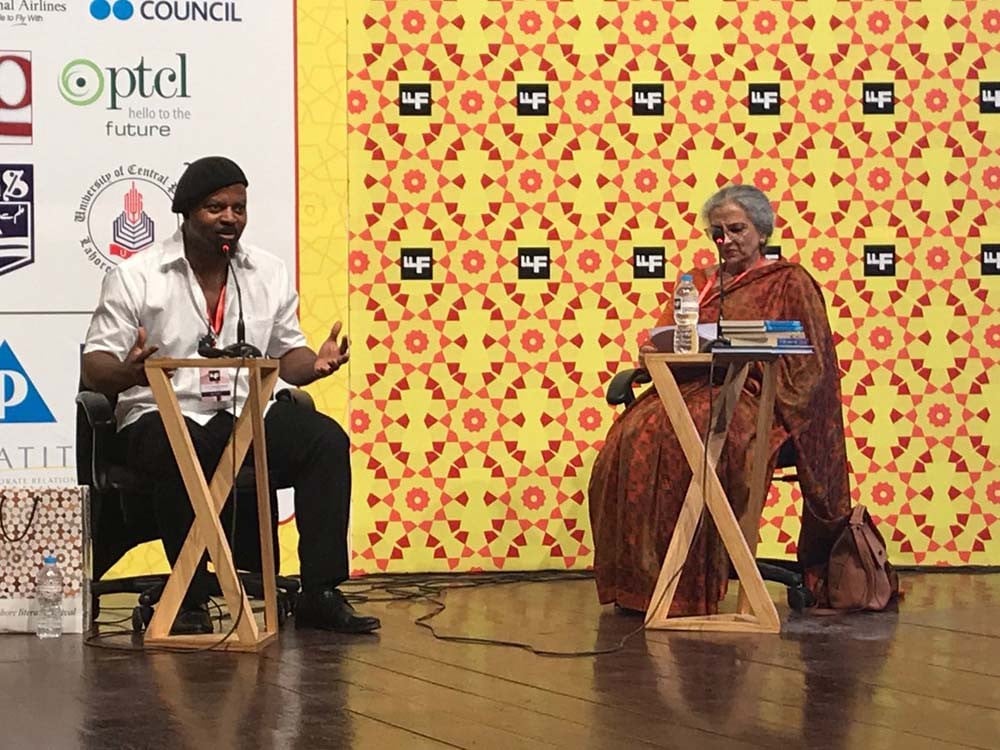
The festival was marked by a bright constellation of celebrity authors

At the Lahore Literary Festival (LLF) 2018, it was many foreign authors’ first time in Pakistan - thus attracting their fans to the venue.
Salman Rashid’s latest book, published in India, is the story of his grandfather’s pre-partition household. A Time of Madness - A memoir of partition narrates how Rashid’s grandfather was murdered by a Sikh neighbour. Ten years ago, Rashid met the son of the murderer in Jalandhar and he narrated the tale of the entire household to the audience.
The talk was moderated by academic Shaista Sirajuddin and senior journalist Khaled Ahmed, both close friends of the author, who had heard of these stories already and read the book closely.
Sirajuddin understood the author’s sentimental relationship with the story and carefully directed the talk while giving the author room to breathe and grieve.
The hall was full of Rashid’s fans, some sitting on the ground, others standing on the stairs. The audience had many interesting questions to supplement Rashid’s intriguing story.
Amardeep Singh is a Punjabi author based in Singapore who has been visiting Pakistan frequently in the last two years. His session, on the evening of the first day, was moderated by Rina Saeed Khan. A multimedia savvy and self-assured Singh swiftly took over the stage. He knew the thesis he was building, probably because he has travelled with his book throughout the world, introducing Sikh history and their footprints in Pakistan to an often surprised audience.
There are some common misconceptions that Singh seeks to explore and becomes unnerved when they are repeated. The first one is that he isn’t working on Sikh Gurdwaras in Pakistan. He is working on a much larger Sikh history in what is now Pakistan - which includes tracing Sikh buildings, people, festivals and the impact on different cultures that the Sikh religion and period have had.
Read also: Lessons in creativity
Secondly, he disapproves of the notion that Sikhs living abroad should lead the rescue efforts of Sikh temples and other buildings affiliated with the era of Sikh rule. This is Punjab’s history, Pakistan’s heritage and its multi-religious past must be embraced by modern day Pakistanis. Singh wants to deepen the official narrative in Pakistan and dampen the hateful narrative against Pakistan. But he is also well aware that this reforming of narratives and restoration of monuments is a complex and laborious job.
Singh recounted his tales of traveling to countless towns and cities in Pakistan with joy and affection. Tales about a man who hugged Singh because he reminded him of his pre-partition Sikh friend, and another man who welcomed him with rose petals at Bulleh Shah’s mazaar. He said he believes he must be blessed to be given this opportunity which even most Pakistanis have not had.
Singh emphasised on the syncretic past of Sikhs and Muslims, the Sufi poets and the Gurus as well that of Guru Nanak and Bhai Mardana. His two books, Lost Heritage - The Sikh Legacy in Pakistan and the The Quest Continues - Lost Heritage, The Sikh Legacy in Pakistan, each weigh three kilos and come with stunning visuals to bewitch readers.
Another celebrated speaker was Nigerian poet and novelist, Ben Okri. Even he must have been shocked to discover so many followers in Lahore. Each time he finished a session, his fans surrounded him for book signing. After his closing session, he sat near the bookstalls where dozens of people, huddled around him for photos, selfies and book signing.
On the second day, one of the last sessions was a poetry recital with Okri, Arab poet and novelist Sinan Antoon, and Salman T. Kureishi, This session was also moderated by Shaista Sirajuddin.
Okri read some of his unpublished poems. Marked by violence, resistance, bloodshed, the poetry was from a world that exists in the vulnerable east instead of the stable west. But the poems were sensual, evoking images, scents and feelings of conflict zones in Africa and the Middle East.
The overall attendance of the festival might be less than previous years but the sessions, particularly those with foreign authors, were very well-attended. The audience comprised fans, readers and academics who also asked intelligent questions. Hence, the LLF was a real boon for the readers, who cherished every moment of the festival.